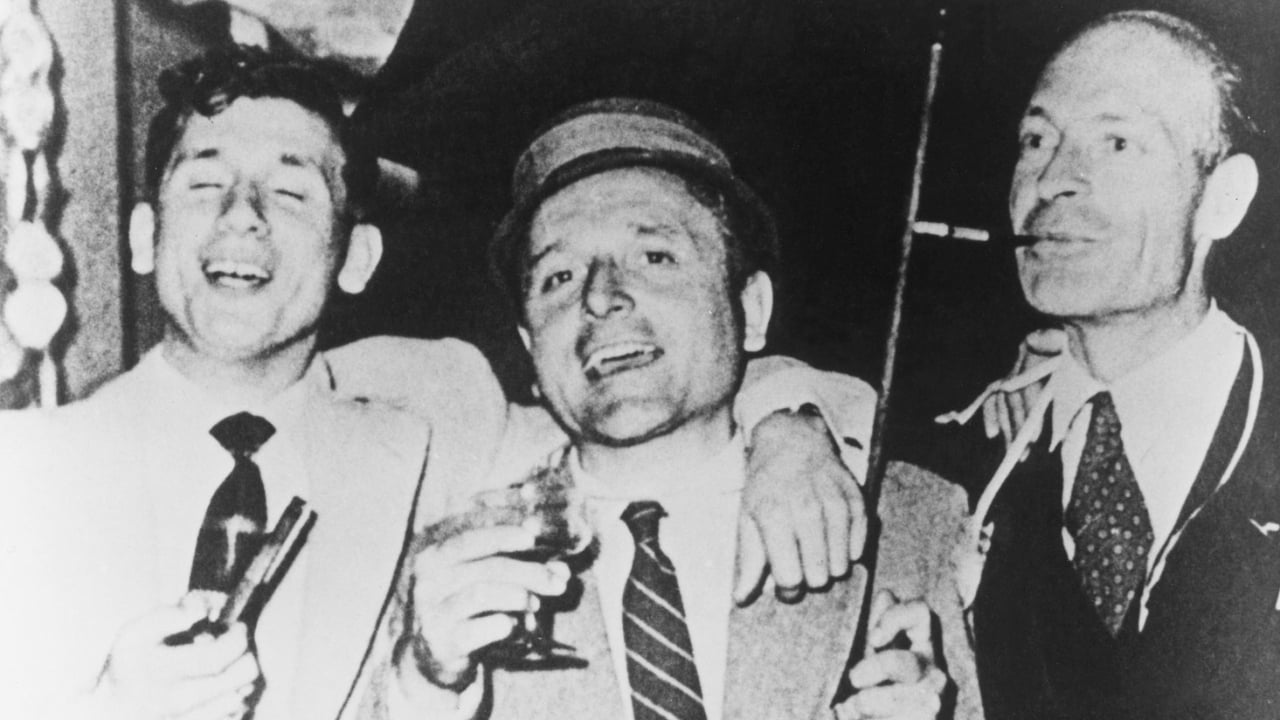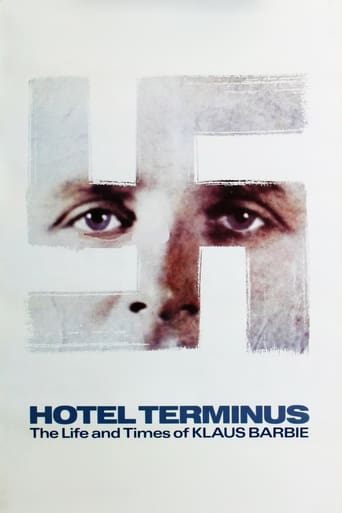

What a waste of my time!!!
... View MoreVery Cool!!!
... View MoreGood concept, poorly executed.
... View MoreThe first must-see film of the year.
... View More"Klaus Barbie. Sometimes known as the Butcher of Lyons" is the quote I remember in the film Rat Race, obviously not the fashion doll Barbie that's made millions over the years haha. This is how I found out about Klaus Barbie, the focus in this French / German / English language film, that I found in the book 1001 Movies You Must See Before You Die, directed by Marcel Ophüls (The Sorrow and the Pity). Narrated by Jeanne Moreau, basically this film deals with the life, career and trial of Nazi SS officer Klaus Barbie, known as the Butcher of Lyons, virtually all aspects of his life are covered. This includes Barbie's childhood and school life in Germany, his early experiences in the military and progressing career, his role in the head of intelligence in Lyons, his employment before World War II by the U.S. military, his life in Bolivia, his return to Europe, and his trial and conviction for his crimes against humanity. Interviewed throughout the film are friends, enemies, associates, heroes and traitors of Barbie. I will be honest and say that I could not fully keep up with who was who in the contributions, especially when it kept changing languages and subtitle translations, but most of what was being discussed was interesting enough, so it was an alright documentary. It won the Oscar for Best Documentary Feature. Worth watching, in my opinion!
... View MoreMarcel Ophuls, son of esteemed film director Max Ophuls, directs "Hotel Terminus", an award winning documentary about Nazi war criminal Klaus Barbie. Beginning in childhood, and therefore innocence, and ending with Klaus becoming "the Butcher of Lyon", the film traces Klaus' life by assembling over forty years of footage and interviews culled from over 120 hours of discussion with former Nazis, American intelligence officers, South American government officials, victims of Nazi atrocities and witnesses.A Gestapo Chief in Lyon, Klaus was responsible for torturing and murdering resistance fighters, Jewish men, woman and children, and had thousands deported to Hitler's death camps. After the war, like many German and SS officers, he was protected by and worked with the US Army, who hid him in Bolivia where he lived for 3 decades as a business man. It was only in 1987, when the Cold War was drawing to a close, and with it Klaus' usefulness to the US, that Klaus was brought to trial in a French courtroom for crimes against humanity.Ophuls paints a truly complex portrait of evil, his film highlighting how responsibility is diffused in hierarchal structures, how Communist paranoia resulted in many Nazi officers being willingly absorbed by the amnesic Allies, and delineating the various forces which allowed Klaus to survive after the war. A stand out scene involves Ophuls (himself German born) revealing his Jewish identity to an associate of Klaus, but much of this 4 and a half hour documentary is rather low key, revoking easy sensationalism for an objective, probing tone.Surprisingly, the film has a comedic streak, Ophuls pointing out the inconsistencies in testimonies, undermining the statements of various German officers with clever quips and using German folksongs as an ironic counterpoint to several scenes. 9/10 – Worth one viewing. Makes a good companion piece to Ophuls' "The Sorrow and the Pity". See "The Conformist".
... View MoreI have always been fascinated by history as a subject and just cannot understand why so few people show any interest in it. I have no illusions, Marcel Ophüls' long documentary about the life and times of Klaus Barbie, a brutally efficient German police chief in occupied France in World War Two, will hardly convert anyone into an avid historian. But I think it is a collective testimony that will outlive the present and could be used in history classes in a number of countries all over the world. Today and tomorrow. The director, who throughout the movie appears as an interviewer, is an angry man. He acts accordingly and knows what he wants from the faces he encounters during the making of Hôtel Terminus. And he has an almost uncanny talent to get from the interviewed what he wants. But it feels real and I am positive that Hôtel Terminus is a frank and biased documentary. Its main aim is to convey information about facts and human nature. No one will ever be able to use it for any kind of indoctrination. Basically, the movie is a biography of Barbie, from the beginnings in provincial Germany up to his trial in the late eighties in Lyon. Ophüls visits apparently within a very short stretch of time - the places where Barbie lived: in Germany, France and Bolivia. He talks to people there. Some have to say something about Barbie and what he did, some have not or do not want to. A wide range of statements and non-statements is artfully woven into a tissue that shows how concerned respectively unconcerned humanity as a whole can be about past events, however terrible they are. Shots of landscapes, short sequences of documentary footage and excerpts of local folkloric or popular tunes are cleverly inserted into that texture and give the statements additional emotional weight.The movie is very concerned about two particular incidents. This maybe constitutes a weakness because the attention is directed away from Barbie. It probes deeply into the arrest and the disappearance of legendary French resistance leader Jean Moulin and into the abduction of the «enfants d'Isieux», Jewish children who found shelter in an isolated boarding school and were betrayed to the German forces of occupation. The point here is, that Barbie as the man held responsible for the two incidents had to count on French collaborators. There were suspicions that the French authorities were for a long time not very anxious to bring Barbie to trial as he had inside knowledge that would tarnish the official history of France during World War Two. The two «sub chapters» feel as if they were made specifically for a French audience, especially in the intricate Moulin affair it is difficult for an outsider to follow.The most striking result of Hôtel Terminus is that it shows the brutal banality of terror in a totalitarian regime. Barbie, basically a public servant with a sadistic streak who executes orders he was given, does not really become alive as a character. Somehow he gradually vanishes further and further into the background. He does not play the chief villain in this movie but is used as an example of one of many ruthless henchmen of a tyranny. The message of Hôtel Terminus is, as I see it, that only the complicity or the indifference of the "general public" made Barbie's career and the atrocities he was capable of possible.
... View MoreThe film is very good but sags in the third hour. However, you must stay with it. Take a break, have some coffee, and come back. I saw this film a good five years ago, but the final few sentences were so moving I remember them still, word for word. It must be seen. We're talking hot tears and goosebumps.
... View More